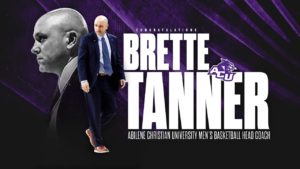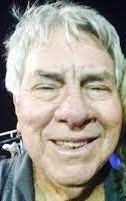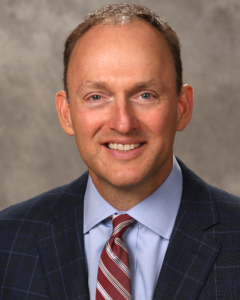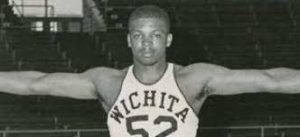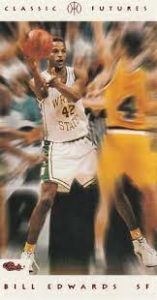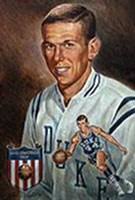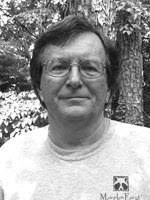We are keeping our fingers crossed in the hope that we can return to a “normal” version of college basketball this year: fans in the stands, announcers without masks, etc. Nobody knows exactly what is going to happen but we will try to restore some order with season previews featuring the best players/coaches in the country. We commence our coverage with new Abilene Christian head coach Brette Tanner. HoopsHD’s Jon Teitel got to chat with Coach Tanner about upsetting Texas in the NCAA tourney last season and his expectations for this season.
You played college basketball at Allen County CC/Emporia State: how good a player were you back in the day, and how did you get into coaching? I thought that I was pretty good at the time but later realized that I was not very good! There was a rule about how many out-of-state players you could have at a Kansas junior college so as an in-state kid there were coaches lining up to recruit me. I played for some legendary coaches and always knew that I wanted to be a coach myself. I wanted to play for guys who could help me get my foot in the door and was fortunate enough to do that.
You spent the past 8 years as an assistant to Joe Golding at Abilene Christian: what makes him such a good coach, and are we going to see UTEP on your schedule anytime soon? I do not know if we will see UTEP on the schedule anytime soon just to be fair to him. When I came here from Stephen F. Austin in 2013 and had to go back and play them it was tough for me to do. I think we might play the Miners once Joe’s former players are gone. He is a good coach because he has zero ego, which is rare in this business. He surrounds himself with talented people and does not micromanage them. He has taught me the importance of building relationships with his players: it is real and he helped me grow that same philosophy, which is more important than winning/losing.
Coach Golding called you the “architect” of the Wildcats’ dominant defense: what is the key to creating a great defense? It is not rocket science and there are a bunch of ways to skin a cat. Our guys trust us and they know that we will do everything we can to put them in a position to be successful. We play super-hard but they also play free of the fear of making mistakes.
In the 2021 NCAA tourney your team had a 1-PT upset of Texas (www.youtube.com/watch?v=81A14JTZXdY): where does that rank among the greatest wins of your career? That has to be up there! My whole family went to school in the state of Oklahoma so I think the biggest win in the past was in December of 2007 when I was an assistant at SFA and we beat OU/Blake Griffin. Being in the state of Texas and beating the Longhorns with someone who I am so close with was pretty special: it is definitely #1 now.
There were a ton of other teams from the Lone Star State in the tourney last March (including Final 4 participant Houston and eventual champ Baylor): how goes the evolution from a football culture to a basketball culture? We were actually just having this conversation at lunch the other day. Football is still pretty important but basketball is growing tremendously because there is so much talent in this state. I also look at schools like Texas/Texas Tech who have made big investments in basketball, which has gotten us to where we are today.
You were hired as head coach in April: how is it going so far? Great! I will be able to tell you more in December but Joe gave me a voice when I was an assistant and he let me coach the defense 100%, which helped this transition. The guys have faith in me whether we win or lose that we are doing things the right way. I am excited for the new journey but it is the same goal.
You lost a few players to graduation/transfer but do return Damien Daniels, who was named conference tourney MVP last March: how crucial will he be to your team’s success this year? He will be extremely crucial as this is his 4th year in the program. We have a couple other returning all-conference/all-defensive players in Coryon Mason/Reggie Miller who will be huge for us. We have some new guys in the post but our guard corps is extremely talented/experienced, which will really help us on defense.
Your non-conference schedule includes a pair of games to open the season at Utah/Texas A&M: which of these games do you feel will present your biggest test? Both of them. I have been doing the schedule for us for a long time and thought it was easy…but now that I moved over 6 feet I feel that the schedule is terrible! Utah has a new coach in Craig Smith, and Buzz Williams is building A&M into a basketball school. They will both be huge challenges for us but so will in-state teams like UT-Arlington. People do not realize how good the mid-majors are: Jacksonville State is bringing every single player back and Drexel was an NCAA tourney team. We do not have any D-1 slop on our schedule so there is no rest for us.
Your roster includes players from Italy/Rwanda/Australia: what sort of recruiting philosophy do you have? My background is junior college but I realize the importance of recruiting high school players. Everyone this year was recruiting in the transfer portal and nobody was recruiting JC players so we picked up 3 kids that I think will be steals. I have been very vocal that international recruiting can be a niche for us. We have an unbelievable international department here and we need to keep working on that.
What are your goals for this season, and what are your expectations for this season? My expectations do not matter: they have already been set for me. Part of me wishes I had taken over a bad program with no pressure at all…but if we had not created high expectations then we probably would have been fired! I will not run from the expectations as we move into a basketball league like the WAC: we want to be in a position to compete for a championship in March and be even better than we were a year ago. We are embracing expectations and will try to meet them.

